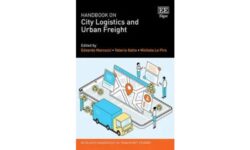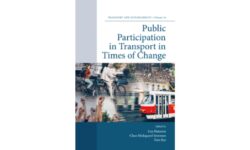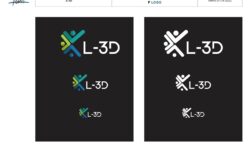Journal Publication
Challenges for Public Participation in Sustainable Urban Logistics Planning: The Experience of Rome
Comunicazione L-3D : una nuova frontiera
Estimation of consistent Logit and Probit models using best, worst and best–worst choices
The paper considers random utility models that use a single common vector of random utilities for the computation of best, worst and best–worst choice probabilities, i.e. consistent models. …
Crowdshipping: il potenziale di un sistema di consegna alternativo
Sustainable urban freight transport adopting public transport-based crowdshipping for B2C deliveries
Cities crave innovative logistics solutions dealing with the requirements of the ‘on demand economy’. The paper estimates the willingness to act as a crowdshipper (supply) and to buy a crowd…
Planning with stakeholders: Analysing alternative off-hour delivery solutions via an interactive multi-criteria approach
Many cities of different size and in different areas of the world have successfully tested the introduction of off-hour deliveries (OHD) on a voluntary basis, reporting positive effects, bot…
Public Transport-Based Crowdshipping for Sustainable City Logistics: Assessing Economic and Environmental Impacts
This paper aims at understanding and evaluating the environmental and economic impacts of a crowdshipping platform in urban areas. The investigation refers to the city of Rome and considers …
European urban freight transport policies and research funding: are priorities and H2020 calls aligned?
The European Commission (EC) has recently developed a growing awareness and interest with respect to the challenges urban freight transport (UFT) poses. Consequently, the EC has started defi…
Quali sono gli effetti del pagamento del parcheggio sulla scelta modale dei lavoratori? Implicazioni sulle politiche dei trasporti
La gamification per favorire il coinvolgimento e il cambio di comportamento degli stakeholder della logistica urbana
Sustainable crowdshipping using public transport: a case study evaluation in Rome
The paper analyses the willingness to act as a crowdshipper in the case of a last mile B2C e-commerce for pick up/delivery. Specifically, it focuses on crowdshipping services deployed using …
Analisi ex-ante dell’accettabilità e stima dello shift modale di un sistema di road pricing: il caso di Roma
Large cities like London, Stockholm and Milan have adopted traffic policies for their central areas based on charges applying to the inbound car traffic. The paper, after a comparative revie…
Willingness to pay measures to tailor policies and foster stakeholder acceptability in urban freight transport
Policy-making on Urban Freight Transport (UFT) is complex because it requires dealing with heterogeneous stakeholders with different objectives. The often unforeseen and undesired results de…
Using Repeated-Measurement Stated Preference Data to Investigate Users’ Attitudes Towards Automated Buses Within Major Facilities
The paper reports on the results of an investigation about users’ attitudes towards automated and conventional minibuses for routes within major facilities. A common stated preference questi…
Connected shared mobility for passengers and freight: Investigating the potential of crowdshipping in urban areas
Passengers and freight mobility in urban areas represents an increasingly relevant component of modern city life. On one side, it fosters economic growth, but, on the other, it also generate…
Smart urban freight planning process: integrating desk, living lab and modelling approaches in decision-making
This paper proposes an innovative approach to decision-making processes for urban freight planning that could easily be transferred across cities while capable of jointly taking into account…
Investigating the potential for off-hour deliveries in the city of Rome: Retailers’ perceptions and stated reactions
This paper investigates the potential for off-hour deliveries in the city of Rome. It focuses on retailers that play a fundamental role in the decision making process often determining deliv…
Simulating participatory urban freight transport policy-making: Accounting for heterogeneous stakeholders’ preferences and interaction effects
This paper proposes a novel approach to support participatory decision-making processes in the context of urban freight transport through the integration of discrete choice modeling and agen…
Towards a decision-support procedure to foster stakeholder involvement and acceptability of urban freight transport policies
This paper addresses the complex problem of multi-stakeholder decisions in urban freight transport policy-making from a public authority perspective, by proposing a procedure based on a mode…
Role-playing games as a mean to validate agent-based models: an application to stakeholder-driven urban freight transport policy-making
Agent-based models (ABMs) are widely used to replicate transport environments accounting for interaction among stakeholders. Validation of ABMs implies assessing the extent to which the mode…
Measuring the effects of an urban freight policy package defined via a collaborative governance model
In recent years the European Commission has increasingly focused its attention on the development of sustainable city logistics by promulgating legislation and formal directives. Despite the…
Come valutare l’accettabilità delle politiche sulla logistica urbana? Integrazione di modelli di scelta discreta e modelli basati sull’agente
Behavioural implications of non-linear effects on urban freight transport policies: The case of retailers and transport providers in Rome
Cities import goods and freight transport is essential. However, it also generates social costs. Ensuring efficient urban freight transport is important although difficult. Policy makers int…
How good are retailers in predicting transport providers’ preferences for urban freight policies?… and vice versa?
The success or failure of urban freight transport measures crucially depends on local policy makers’ knowledge and awareness of stakeholders’ preferences. The behavioral approach calls for s…
Modelling individual preferences for environmental policy drivers: Empirical evidence of Italian lifestyle changes using a latent class
Degraded air quality severely affects the health of citizens worldwide. The design of effective policies requires exploring public preferences for environmental and air quality policy instru…
Investigating users’ attitudes towards conventional and automated buses in twelve European cities
Driverless buses running in urban low-speed, mixed-traffic conditions are the subject of current research and demonstration in Europe. The paper aims to assess how automation fares with resp…
The Geographies of Air Transport
The book edited by Goetz and Budd represents a timely contribution with respect to an important and critical industrial sector for economic development and well being throughout the world. I…
Urban freight, parking and pricing policies: an evaluation from a transport providers & perspective
This paper investigates transport providers’ preferences for alternative loading bays and pricing policies. It estimates the importance of loading bays, the probability of finding them free …
On finite sample performance of confidence intervals methods for willingness to pay measures
This paper systematically compares finite sample performances of methods to build confidence intervals for willingness to pay measures in a choice modeling context. It contributes to the fie…
Stakeholder-specific data acquisition and urban freight policy evaluation: evidence, implications and new suggestions
Cities, characterised by scarce resources and facing increasing citizens’ requests for more liveable and attractive environments, need to define and implement more efficient urban freight tr…
Regulating Transport in Europe
This article concerns the regulation of transport within a European context, covering air, inland waterways, rail, road passenger and freight, urban public transport, and short sea shipping….
De Gustibus Disputandum Est: Non-Linearity in Public Transportation Service Quality Evaluation
User perceptions of service quality are essential to promote public transport ridership and trigger positive externalities. Therefore, research efforts need to analyze service quality from t…
Urban freight transport policy changes: improving decision makers’ awareness via an agent-specific approach
This paper derives policy implications from agent-specific data with respect to the implementation of policy changes in the case of urban freight transport. In particular, the research, base…
Intra-agent heterogeneity in urban freight distribution: the case of own-account operators
Urban freight distribution policies aim to improve the efficiency of deliveries of goods in cities. Local policy makers intervene on rooted, complex and pre-existent relationships. Various a…
Multi-level governance and transport policy: the case of local roads in Italy
Italy is a multi-level polity where policymaking and implementation involves both public and private actors. Both territorial and functional decentralisation have an impact on the final resu…
Testing for nonlinearity in the choice of a freight transport service
Manufacturing firms buy transport services with the aim of minimizing their total logistics cost. There is a large amount of literature analyzing how shippers value the various characteristi…
A medium term evaluation of the Ecopass road pricing scheme in Milan: economic, environmental, and transport impacts
The aim of this paper is to provide an economic, environmental and transport evaluation of the Ecopass scheme implemented since January 2008 in Milan. Building on previous evaluation, this p…
Energy Efficiency in the Transport Sector: Policy Evolution in some European Countries
In the last years Energy Efficiency (EE) has become an important issue in the public policy makers’ agenda due to ambitious objectives of the European Commission to reduce energy consumption…
Stakeholder reactions to urban freight policy innovation
Urban freight policies aim to minimise negative economic and environmental impact of freight movement in cities. At present, sustainable urban freight management is often hampered by a lack …
Dissecting preference heterogeneity in consumer stated choices
This paper investigates alternative methods to account for preference heterogeneity in choice experiments. Heterogeneity can be explained by assuming its influence to impact the systematic c…
A Stated Ranking Experiment to Study Policy Acceptance: The Case of Freight Operators in Rome’s LTZ
City logistics require an understanding of a number of issues that are seldom accounted for in current research. Policies may produce unsatisfactory results because behavioural and contextua…
Regional airport choice: consumer behaviour and policy implications
The analysis of origin airports in multi-airport regions has a well established tradition in transportation and regional economics. The main goal of the paper is to estimate the importance o…
Comparing single and joint preferences: a choice experiment on residential location in three-member householders
There is growing evidence indicating that there can be significant differences between choices made by single individuals and those made by the same individuals when choosing collectively. T…
The Urban Road Pricing Scheme to Curb Pollution in Milan, Italy: Description, Impact and Preliminary Cost-Benefit Analysis Assessment
Starting from January 2008 Milan implemented a charging scheme to enter an 8 km2 area of the city centre. The term used to denote the scheme is Ecopass, conveying the stated political object…
Urban freight policies and distribution channels
Urban areas are vital centers of economic activity and innovation generating large economies of density and proximity. Yet, procuring and distributing goods in an urban context is fraught wi…
Environmental quality and accessibility trade-offs in household residential location choice: a test of the representative member hypothesis and relative power analysis
The paper illustrates a method to detect and estimate interaction effects in household decision-making and tests the representative member hypothesis by studying how preferences of single me…
Special issue: Transport and Urban Economics
Special Issue: Transport and Urban Economics Guest editors: Romeo Danielis, Andre de Palma, Edoardo Marcucci, Esko Niskanen, Hadewijch van Delft, Erik Verhoef Danielis, R., de Palma, A., Mar…
Specific vs. generic goods: implications for transport demand analysis
In this paper, we investigate the theoretical and empirical relevance of the distinction between generic goods and specific goods for the understanding of freight transportation demand. Spec…
The potential demand for a urban freight consolidation centre
This paper reports the results of a stated-preference study aimed at investigating how transport decisions are made by receivers or by transport operators about the potential use of an urban…
Attribute cut-offs in freight service selection
The paper applies the choice model incorporating attribute cut-offs proposed by [Swait, J.D., 2001. A non-compensatory choice model incorporating attribute cutoffs. Transportation Research: …
Quality and Public Transport Service Contracts
Service contracts are the natural method to set bilateral commitments. In transport service context, public authorities and transport operators have different goals, therefore regulation pla…
Logistics managers’ stated preferences for freight service attributes
This paper reports the results of an adaptive conjoint analysis (ACA) experiment performed in two Italian regions that estimates logistics managers’ preferences for freight service attribute…
Bottleneck road congestion pricing with a competing railroad service
The paper examines the efficiency of different road pricing regimes in reducing the total costs of travel when a competing railroad service is available. Extending the two-mode model develop…
Challenges for Public Participation in Sustainable Urban Logistics Planning: The Experience of Rome
Comunicazione L-3D : una nuova frontiera
Estimation of consistent Logit and Probit models using best, worst and best–worst choices
The paper considers random utility models that use a single common vector of random utilities for the computation of best, worst and best–worst choice probabilities, i.e. consistent models. …
Crowdshipping: il potenziale di un sistema di consegna alternativo
Sustainable urban freight transport adopting public transport-based crowdshipping for B2C deliveries
Cities crave innovative logistics solutions dealing with the requirements of the ‘on demand economy’. The paper estimates the willingness to act as a crowdshipper (supply) and to buy a crowd…
Planning with stakeholders: Analysing alternative off-hour delivery solutions via an interactive multi-criteria approach
Many cities of different size and in different areas of the world have successfully tested the introduction of off-hour deliveries (OHD) on a voluntary basis, reporting positive effects, bot…
Public Transport-Based Crowdshipping for Sustainable City Logistics: Assessing Economic and Environmental Impacts
This paper aims at understanding and evaluating the environmental and economic impacts of a crowdshipping platform in urban areas. The investigation refers to the city of Rome and considers …
European urban freight transport policies and research funding: are priorities and H2020 calls aligned?
The European Commission (EC) has recently developed a growing awareness and interest with respect to the challenges urban freight transport (UFT) poses. Consequently, the EC has started defi…
Quali sono gli effetti del pagamento del parcheggio sulla scelta modale dei lavoratori? Implicazioni sulle politiche dei trasporti
La gamification per favorire il coinvolgimento e il cambio di comportamento degli stakeholder della logistica urbana
Sustainable crowdshipping using public transport: a case study evaluation in Rome
The paper analyses the willingness to act as a crowdshipper in the case of a last mile B2C e-commerce for pick up/delivery. Specifically, it focuses on crowdshipping services deployed using …
Analisi ex-ante dell’accettabilità e stima dello shift modale di un sistema di road pricing: il caso di Roma
Large cities like London, Stockholm and Milan have adopted traffic policies for their central areas based on charges applying to the inbound car traffic. The paper, after a comparative revie…
Willingness to pay measures to tailor policies and foster stakeholder acceptability in urban freight transport
Policy-making on Urban Freight Transport (UFT) is complex because it requires dealing with heterogeneous stakeholders with different objectives. The often unforeseen and undesired results de…
Using Repeated-Measurement Stated Preference Data to Investigate Users’ Attitudes Towards Automated Buses Within Major Facilities
The paper reports on the results of an investigation about users’ attitudes towards automated and conventional minibuses for routes within major facilities. A common stated preference questi…
Connected shared mobility for passengers and freight: Investigating the potential of crowdshipping in urban areas
Passengers and freight mobility in urban areas represents an increasingly relevant component of modern city life. On one side, it fosters economic growth, but, on the other, it also generate…
Smart urban freight planning process: integrating desk, living lab and modelling approaches in decision-making
This paper proposes an innovative approach to decision-making processes for urban freight planning that could easily be transferred across cities while capable of jointly taking into account…
Investigating the potential for off-hour deliveries in the city of Rome: Retailers’ perceptions and stated reactions
This paper investigates the potential for off-hour deliveries in the city of Rome. It focuses on retailers that play a fundamental role in the decision making process often determining deliv…
Simulating participatory urban freight transport policy-making: Accounting for heterogeneous stakeholders’ preferences and interaction effects
This paper proposes a novel approach to support participatory decision-making processes in the context of urban freight transport through the integration of discrete choice modeling and agen…
Towards a decision-support procedure to foster stakeholder involvement and acceptability of urban freight transport policies
This paper addresses the complex problem of multi-stakeholder decisions in urban freight transport policy-making from a public authority perspective, by proposing a procedure based on a mode…
Role-playing games as a mean to validate agent-based models: an application to stakeholder-driven urban freight transport policy-making
Agent-based models (ABMs) are widely used to replicate transport environments accounting for interaction among stakeholders. Validation of ABMs implies assessing the extent to which the mode…
Measuring the effects of an urban freight policy package defined via a collaborative governance model
In recent years the European Commission has increasingly focused its attention on the development of sustainable city logistics by promulgating legislation and formal directives. Despite the…
Come valutare l’accettabilità delle politiche sulla logistica urbana? Integrazione di modelli di scelta discreta e modelli basati sull’agente
Behavioural implications of non-linear effects on urban freight transport policies: The case of retailers and transport providers in Rome
Cities import goods and freight transport is essential. However, it also generates social costs. Ensuring efficient urban freight transport is important although difficult. Policy makers int…
How good are retailers in predicting transport providers’ preferences for urban freight policies?… and vice versa?
The success or failure of urban freight transport measures crucially depends on local policy makers’ knowledge and awareness of stakeholders’ preferences. The behavioral approach calls for s…
Modelling individual preferences for environmental policy drivers: Empirical evidence of Italian lifestyle changes using a latent class
Degraded air quality severely affects the health of citizens worldwide. The design of effective policies requires exploring public preferences for environmental and air quality policy instru…
Investigating users’ attitudes towards conventional and automated buses in twelve European cities
Driverless buses running in urban low-speed, mixed-traffic conditions are the subject of current research and demonstration in Europe. The paper aims to assess how automation fares with resp…
The Geographies of Air Transport
The book edited by Goetz and Budd represents a timely contribution with respect to an important and critical industrial sector for economic development and well being throughout the world. I…
Urban freight, parking and pricing policies: an evaluation from a transport providers & perspective
This paper investigates transport providers’ preferences for alternative loading bays and pricing policies. It estimates the importance of loading bays, the probability of finding them free …
On finite sample performance of confidence intervals methods for willingness to pay measures
This paper systematically compares finite sample performances of methods to build confidence intervals for willingness to pay measures in a choice modeling context. It contributes to the fie…
Stakeholder-specific data acquisition and urban freight policy evaluation: evidence, implications and new suggestions
Cities, characterised by scarce resources and facing increasing citizens’ requests for more liveable and attractive environments, need to define and implement more efficient urban freight tr…
Regulating Transport in Europe
This article concerns the regulation of transport within a European context, covering air, inland waterways, rail, road passenger and freight, urban public transport, and short sea shipping….
De Gustibus Disputandum Est: Non-Linearity in Public Transportation Service Quality Evaluation
User perceptions of service quality are essential to promote public transport ridership and trigger positive externalities. Therefore, research efforts need to analyze service quality from t…
Urban freight transport policy changes: improving decision makers’ awareness via an agent-specific approach
This paper derives policy implications from agent-specific data with respect to the implementation of policy changes in the case of urban freight transport. In particular, the research, base…
Intra-agent heterogeneity in urban freight distribution: the case of own-account operators
Urban freight distribution policies aim to improve the efficiency of deliveries of goods in cities. Local policy makers intervene on rooted, complex and pre-existent relationships. Various a…
Multi-level governance and transport policy: the case of local roads in Italy
Italy is a multi-level polity where policymaking and implementation involves both public and private actors. Both territorial and functional decentralisation have an impact on the final resu…
Testing for nonlinearity in the choice of a freight transport service
Manufacturing firms buy transport services with the aim of minimizing their total logistics cost. There is a large amount of literature analyzing how shippers value the various characteristi…
A medium term evaluation of the Ecopass road pricing scheme in Milan: economic, environmental, and transport impacts
The aim of this paper is to provide an economic, environmental and transport evaluation of the Ecopass scheme implemented since January 2008 in Milan. Building on previous evaluation, this p…
Energy Efficiency in the Transport Sector: Policy Evolution in some European Countries
In the last years Energy Efficiency (EE) has become an important issue in the public policy makers’ agenda due to ambitious objectives of the European Commission to reduce energy consumption…
Stakeholder reactions to urban freight policy innovation
Urban freight policies aim to minimise negative economic and environmental impact of freight movement in cities. At present, sustainable urban freight management is often hampered by a lack …
Dissecting preference heterogeneity in consumer stated choices
This paper investigates alternative methods to account for preference heterogeneity in choice experiments. Heterogeneity can be explained by assuming its influence to impact the systematic c…
A Stated Ranking Experiment to Study Policy Acceptance: The Case of Freight Operators in Rome’s LTZ
City logistics require an understanding of a number of issues that are seldom accounted for in current research. Policies may produce unsatisfactory results because behavioural and contextua…
Regional airport choice: consumer behaviour and policy implications
The analysis of origin airports in multi-airport regions has a well established tradition in transportation and regional economics. The main goal of the paper is to estimate the importance o…
Comparing single and joint preferences: a choice experiment on residential location in three-member householders
There is growing evidence indicating that there can be significant differences between choices made by single individuals and those made by the same individuals when choosing collectively. T…
The Urban Road Pricing Scheme to Curb Pollution in Milan, Italy: Description, Impact and Preliminary Cost-Benefit Analysis Assessment
Starting from January 2008 Milan implemented a charging scheme to enter an 8 km2 area of the city centre. The term used to denote the scheme is Ecopass, conveying the stated political object…
Urban freight policies and distribution channels
Urban areas are vital centers of economic activity and innovation generating large economies of density and proximity. Yet, procuring and distributing goods in an urban context is fraught wi…
Environmental quality and accessibility trade-offs in household residential location choice: a test of the representative member hypothesis and relative power analysis
The paper illustrates a method to detect and estimate interaction effects in household decision-making and tests the representative member hypothesis by studying how preferences of single me…
Special issue: Transport and Urban Economics
Special Issue: Transport and Urban Economics Guest editors: Romeo Danielis, Andre de Palma, Edoardo Marcucci, Esko Niskanen, Hadewijch van Delft, Erik Verhoef Danielis, R., de Palma, A., Mar…
Specific vs. generic goods: implications for transport demand analysis
In this paper, we investigate the theoretical and empirical relevance of the distinction between generic goods and specific goods for the understanding of freight transportation demand. Spec…
The potential demand for a urban freight consolidation centre
This paper reports the results of a stated-preference study aimed at investigating how transport decisions are made by receivers or by transport operators about the potential use of an urban…
Attribute cut-offs in freight service selection
The paper applies the choice model incorporating attribute cut-offs proposed by [Swait, J.D., 2001. A non-compensatory choice model incorporating attribute cutoffs. Transportation Research: …
Quality and Public Transport Service Contracts
Service contracts are the natural method to set bilateral commitments. In transport service context, public authorities and transport operators have different goals, therefore regulation pla…
Logistics managers’ stated preferences for freight service attributes
This paper reports the results of an adaptive conjoint analysis (ACA) experiment performed in two Italian regions that estimates logistics managers’ preferences for freight service attribute…
Bottleneck road congestion pricing with a competing railroad service
The paper examines the efficiency of different road pricing regimes in reducing the total costs of travel when a competing railroad service is available. Extending the two-mode model develop…







